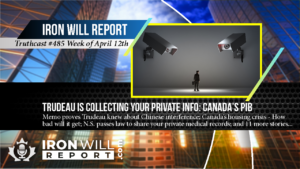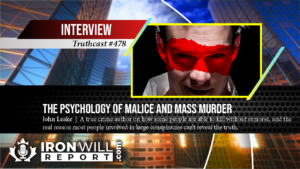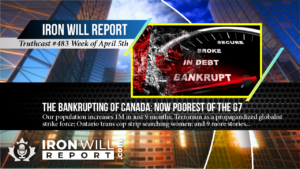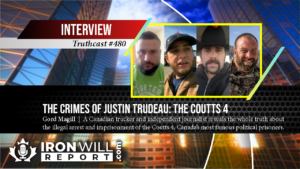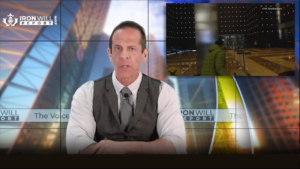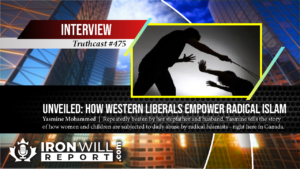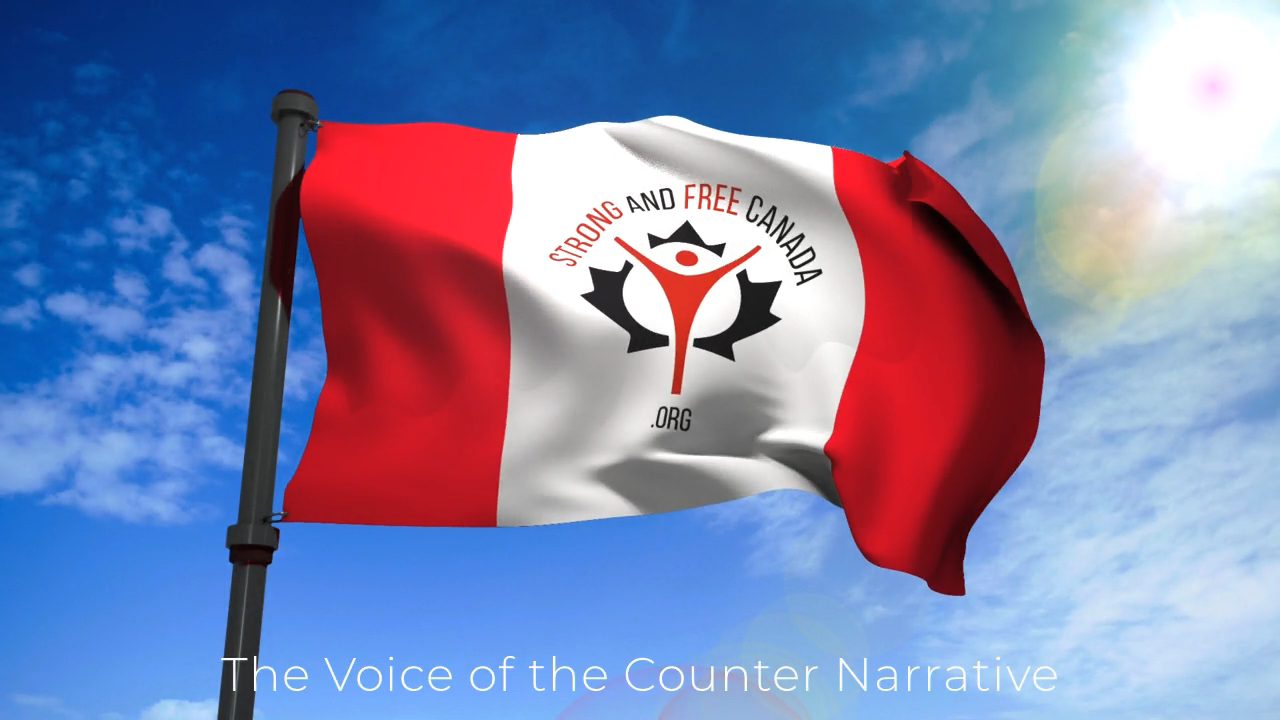Peckford Travel Ban Case; Justice Was TERMINATED But “We’ll Be Back…” | John Carpay
November 10, 2022
- Besides the obvious, why is this ruling of mootness an absurdity?
- Could the mootness ruling be an argument against travel mandates in the future?
- Are there some positives even though the case was terminated?
- Could future mandates help the appeal process and future cases?
- What Oakes test grade does John, as a constitutional lawyer, give the government?
- What appeal processes are underway?
Please share on your social media accounts
SUMMARY KEYWORDS
government, people, court, charter, question, appeal, freedoms, lawyers, moot, Oakes, test, law, mandates, injections, evidence, affidavits, rights, violation, airplane, justice
SPEAKERS
Will Dove, John Carpay
Will Dove 00:15
Many of you are aware of the case by the honorable Brian Peckford, against the federal government for the violations of our freedom of movement under the Charter. I have with me today, John Carpay, a President of the Justice Center for Constitutional Freedoms to discuss that case, John, as always a pleasure to have you on the show.
John Carpay 00:31
Glad to be with you, Will.
Will Dove 00:33
So let’s catch people up for those who aren’t aware of what’s going on. When did the case start? Let’s start there.
John Carpay 00:40
So the travel mandates that prevented Canadians who had not had two injections from getting onto an airplane that kicked in around November, the 29th, November, the 30th, around there in 2021. And so Brian Peckford, who is the last living signatory to the Charter, he actually signed these documents 40 years ago, and is one of these Canadians that has not been injected twice with the substance in respect to which there’s no long term safety data. Uninjected could not get onto an airplane, I would have to or our website would, would have the exact date, but I think it was January, February, possibly as early as December, but not long after November 30. Within the next month or two. The Justice Center filed a court action on behalf of Brian Peckford. And this action moved to head culminating in the month of June, we had six weeks of questioning government witnesses about their affidavits, and government lawyers questioning our witnesses. So a lot of evidence was put forward into this case, a lot of time, effort and energy put into this case. So it was it’s so the case was filed. Not long after the November 30 restrictions were imposed.
Will Dove 02:05
Right? And the primary lawyer in that case was?
John Carpay 02:09
Was and is Keith Wilson He is outside counsel. And so he’s not one of the Justice Center staff lawyers, but we are paying his invoices.
Will Dove 02:17
Right. And Keith was I saw an interview with Keith with Viva Frei. And he made it sound like he really was able to give the government witnesses the gears on this. And of course, the government when they were given the opportunity to cross examine Mr. Peckford declined, because I have no doubt that he would have raked him over the coals on it, because he knows exactly what was intended by the clauses that he helped to draft. So that’s catching up to that point. Now, my understanding and please correct me if I’ve got this wrong, John, was that the case, as you said, was moving along in June. They got as far as September 21 was the day that your lawyers were supposed to be able to start cross examining the government witnesses, I believe, and that was the day when the government lawyers went to the court and asked to have the case ruled moot because the mandates are no longer in place. Now, I’ve rendered my opinion on this to our viewers that it makes about as much sense as rendering an assault case moot because the assault is no longer in progress. But so am facts correct up to that point?
John Carpay 03:24
So this case, this particular case, the nature of it, it was based on affidavits, and then the people get cross examined on their affidavits, and this is taking place outside of the courtroom. So technically not a not a trial. Right. But pretty similar process when you swear an affidavit and it promise to tell the truth, the whole truth, nothing but the truth, so help you God, and you write down what you know, and, and things that are relevant to the case, and then you swear to it, and then you get cross examined on it. But what happened September 21, that was the date when the federal court heard the arguments from the federal government’s lawyers and from our lawyers on the government’s motion to declare it moot. Now, as background information for some of the viewers, if you’re not familiar, a case can be rendered moot if it is no longer relevant. So let’s say there’s a divorcing couple husband and wife and they are fighting over custody of the family dog. This does happen in real life, by the way, sometimes people will go to court to fight over custody of the dog. And let’s say the dog dies. Okay. The courts gonna say the action is now moot, because we could continue it, but we would just have this like very theoretical, useless, irrelevant ruling, that, you know, in theory, based on the balance of the evidence, the wife should get the dog or the husband should get the dog. Right. So it’s a purely theoretical and the court says, Look, we have limited resources. We don’t want to waste court resources on making a ruling on something that has no practical effect, no practical consequence. And so the issue between the parties has disappeared, therefore it’s moot.
Will Dove 05:04
So there’s two questions I want to ask you. And I want to start with just referring to the Oakes Test because I know that a lot of your case is based upon the Oakes Test. And folks, the Oakes Test is used to determine whether or not when the government violates the Charter if it was justified. So we’ll get into that in a minute. But before that, John, I want to ask this question, because and I’m asking your opinion as a lawyer, because if and as I said, folks, we’ll get to the Oakes Test in a minute. But if the Oakes Test was to show that the government’s actions were not justified, that then makes their violation of the Charter illegal. So if that’s the case, then a crime has been committed. Well, isn’t that what the courts are there for, to adjudicate on whether or not a crime was committed? So declaring the case moot, seems to me to be a gross miscarriage of justice?
John Carpay 05:53
Excellent question. I think that the violations of our Charter rights and freedoms are so egregious, and they inflict so much damage on people. I mean, you and I know and people that are listening and watching know that mental health harms on children, people’s livelihoods’ destroyed, close to doubling of the drug overdose deaths. And now, massive inflation and economic problems. Study put out today by the Canadian Taxpayers Federation about more and more people are using the food bank because they have to, because families are just not keeping up with the inflation. So we have is a massive, massive violation of rights and freedoms. Now, on a colloquial, layman’s term, you could say it’s criminal, meaning like, it is so egregious that you say it’s a crime against humanity. And I think politically and philosophically, it’s fair game to argue that these are crimes against humanity.
Will Dove 07:00
Okay, so let me ask the question a little differently. Let’s say, once again, this this case goes through, and the courts find that the government was in the wrong, that they violated the Charter, and it can’t be justified, what they did. So then say the government does turn around down the road. And once again, they restrict travel rights, the mobility rights of the people, if an airline upheld that is the airline now not in contempt of court, couldn’t a traveler or go to that airline and say you’re upholding something that our courts found to be unjustified?
John Carpay 07:32
And the airlines lawyer would probably say, Hey, we’re just following the law that was passed yesterday, or that was passed last week. So, take it up with federal government. It’s a fair question, Will, but what the government would likely do is they would word it differently from the law that was struck down. And so you would have to start new court challenge against it. However, the court challenge against a similar law would be stronger, and quite possibly faster than the initial Peckford challenge. So you’d have to go to court again, it’s not likely that they would pass the same law with the same wording of the previous law that was struck down by the court, but they would tweak it, they would nuance it.
Will Dove 08:21
Okay. So John, now, I have to put you on the spot, because I know what the viewers are thinking. And I’m going to have to ask the question. So if the court was to rule that their actions could not be justified, and that’s not going to result in criminal charges, and it’s not going to stop them from doing it again. What’s the point?
John Carpay 08:40
The point is that it still serves as a very strong deterrence on governments, which, generally speaking, they don’t like court rulings against them. There is still a considerable degree of respect for the rule of law, and most governments would try to abide by court rulings. Now, that’s a gross overgeneralization. I mean, you have you have examples, certainly, the Quebec government in regards to language laws that restrict the use of English in Quebec, they very intentionally disregard court rulings, and that is a deliberate choice. And they’re entitled to under Section 33 of the Charter, the notwithstanding clause, governments can violate Charter rights and freedoms if they say expressly that they are doing so.
Will Dove 09:36
Okay. So that that I’m sorry, that just raises another question. Because, and I can very much see this sort of scenario playing out. We’ve already had Trudeau going on TV saying that if people don’t start lining up for their booster shots, there’s going to be more mandates. So what’s to stop him from just saying, Well, I know these mandates are a violation of the Charter, but we’re going to do that anyway, in the interest of public health. Doesn’t that basically just get the government off the hook right there?
John Carpay 10:04
You know, one, one aspect of it, this is not a complete answer. But if the government introduces new mandates that prevent people from getting on an airplane based on their vaccination status, if the government tries that in the next month, or two or three, they’re going to really help our appeal to succeed because we’re going to be on behalf of Brian Pickford, we’ll be filing these documents in, in the weeks ahead, you have you have 30 days to file the notice of appeal. And so we’re going to be filing these court documents. And if the federal government takes any steps to restrict travel, we can put that in before the Court of Appeal and say, here’s fresh evidence, new evidence that was not available at the trial level. But we note that, you know, December 1, or whatever pick your dates on December 1, the government implemented new travel restrictions. And so this goes to show that our court action was not moot. And so it will help our appeal.
Will Dove 11:18
So knowing that we’ve got these four different cases that have all been amalgamated into one court hearing or whatever the proper term would be for it. I have to ask this next question very delicately. Do you feel that there’s any justification for justice Jocelyn Gagne, declaring this case moot?
11:39
I’m biased. I think it’s a terrible ruling. I think it’s a shame, it’s, it’s wrong. For the reasons that we mentioned a few minutes ago that, you know, what, when Charter rates and freedoms are violated so blatantly, and so flagrantly, it’s just imperative for the court to issue a ruling as to whether these Charter violations were justified yes or no. And some of the evidence, at least was suggesting that no way we had under cross examination, one of the government witnesses admitted under oath that the ban on uninjected people flying on airplanes in Canada was not based on health or science, not based on medicine or science, and that the only reason for the government to have these policies in place was to try to pressure more Canadians into getting injected.
Will Dove 12:37
So John, I want to get into at least briefly the Oakes’ Test, because I know that it’s central to the case. And folks, I can give you a little bit of background as myself. The Oakes Test came from a case I believe it was back in the late 70s, early 80s. David Oakes was arrested for possession of drugs and at the time, the law said that possession meant that you were trafficking. And so he was also charged with trafficking. And he successfully argued that his Charter rights were being violated because it was essentially being found guilty until proven innocent, not the other way around. And the courts upheld that. They said you’re right. The they can’t charge you they can’t assume that you’re guilty. And so out of this came five questions, which comprise the Oakes’ Test. Now, I don’t have those memorized, but I’m pretty sure you do. So if you could run us through these questions. And if you’re allowed to render your opinion on whether or not the government’s actions pass the Oakes’ Test,
John Carpay 13:31
Right. So the way the Charter works is you’ve got you’ve got your rights and freedoms set out. For example Charter Section two freedoms of conscience religion expression, association, peaceful assembly, Charter Section seven right to life, liberty, security, the person Charter Section six, you’ve got your mobility rights to enter remaining and leave Canada freely as a Canadian citizen. And then Section one of the Charter says this Charter guarantees the rights and freedoms set out in it subject only to such reasonable limits prescribed by law as can be demonstrably justified in a free and democratic society. So those components so if the government, for example, lockdowns restrict your freedom of association, if you cannot have Christmas dinner with your mother or with your daughter, that’s a violation of your freedom of association. If you are under pressure, duress, coercion to get injected, that’s an exam that’s a violation of your bodily autonomy protected by Charter Section seven right to life, liberty, security the person. So when the government violates rights and freedoms, they have to justify under Section One that it is prescribed by law. That’s usually pretty straightforward. I mean, if it’s if it’s written down in a health order piece of legislation, it’s usually it’s prescribed by law. That is demonstrably justified so that the onus is on the government to provide evidence in a free and democratic society. So that’s the standard. I mean, you know, should this violation of rights and freedoms be permitted in a free and democratic society? So that all of that’s background information. So that’s section one of the Charter. That’s the section under which the government asked to justify violations of rights and freedoms. Now, the Oakes’ Test specifically, the first part of the Oakes’ Test is, is it a pressing and substantial objective? So it has to be the government needs to go after a serious problem. Okay. So on these on lockdowns, vaccine mandates, travel restrictions, the government would say the pressing objective is to spare people from dying from COVID. That’d be an example the government would say this is our you know, it’s public health, it’s saving lives. That’s our pressing objective. The challengers could say, well, you know, COVID is not the Spanish Flu of 1918. The predictions of Niall Ferguson Imperial College March of 2020, the 10s of millions of people would die are demonstrably false. So we don’t have a pressing and substantial objective to worry about here. So the court would rule on that point, first rule in favor of the government and say, oh, yeah, there’s this objective of saving lives or rule to say that, no, you know, COVID is not as deadly as what government’s made it out to be. Second part of the Oakes’ Test is the minimal impairment. So if a law is going to violate your rights and freedoms for some pressing and substantive objective, it needs to violate your rights and freedoms as little as possible. So minimal impairment.
Will Dove 17:08
And I have not jumped in here with a question that I think people must be asking themselves. In that case, would it not also be relevant that it can even the government has admitted that these injections don’t stop you from getting sick? They don’t stop you from being infectious. So what’s the point of being, you know, being prejudiced towards those who aren’t injected?
John Carpay 17:27
Now? Rational connection? Sorry, they’re not I got them another thing. So right after the pressing and substantial objective, right, the next one, I got them, I got them backwards. Minimal impairment comes second. First is rational connection. So is there a rational connection between the government’s law and the objective that we’re seeking to achieve? And on this point, Brian Peckford and other applicants would argue that, because the vaccines do not stop the spread, and we know this, because the vaccine manufacturers have said so publicly.
Will Dove 18:05
And the statistics show it very clearly, and this majority of people in the last six months who have been hospitalized were injected,
John Carpay 18:11
it didn’t stop. It didn’t stop the Delta variant. It didn’t stop Omicron. The vaccine manufacturers have admitted publicly, it doesn’t stop the spread. So rational connection would be the government has to show that okay, banning the uninjected, referring to the injection of the COVID vaccine, uninjured barring uninjected Canadians from getting onto an airplane is not connected to stopping the spread or saving lives. Why? Because the vaccine, even if it offers some kind of personal protection, right, which different opinions on that, but even if it does offer a personal protection, it does not stop the spread. So there’s no rational connection. I would not want to be a government lawyer trying to argue how banning uninjected people from getting onto the plane is somehow going to stop the spread of COVID.
Will Dove 19:04
And just let me throw this one out there. The example that I used recently, when I produced a brief video on the Oakes’ test was that I think even I would be willing to accept the telling people you gotta maintain six feet of distance would be a minimal impairment, or closing whole businesses that is definitely not a minimal impairment.
John Carpay 19:22
Exactly. Yeah. Yeah. Yeah. Yeah, exactly. Yeah, you could have, you know, assuming for argument’s sake, that this is scientific, and assuming for argument’s sake, that COVID is really as dangerous as the Spanish Flu of 1918, which is that the big lie on which all of these measures have been based in the past two and a half years, but assuming it’s, it’s, you know, a dangerous threat to everybody. And assuming that keeping six feet apart is helpful, then yeah, minimal impairment would be to say, Okay, well, you can be a big store or a small store, but we’ve got proportionate limits on how many people you have coming in, but we’re not going to shut you down entirely.
Will Dove 19:59
Okay. Point Three.
John Carpay 20:01
So the last, the last point is the balancing of benefits and harms. So here the question becomes, are the benefits of the law. so let’s, since we’re dealing with the Peckford case, the law that bans unvaccinated Canadians getting onto an airplane are the benefits in terms of stopping the spreads or slowing down the spread, and thereby saving lives, do those benefits outweigh the harmful effects of having millions of Canadians who cannot get onto an airplane to go visit a loved one in a different province to hold the hand of a dying parent to grieve properly, appropriately, necessarily, at a at a funeral, to attend a wedding, to go to work, to go to school, all have that hardship and suffering, and in many cases, economic losses from people that need to fly. And that is not huge numbers. But there are people who need to fly in order to work, it’s part of your job requirement. So are the benefit do the benefits of saving lives? Do they outweigh the harmful effects? And so on that point as well, the government has to win. So the government has to prove that that there’s a pressing substantial objective that’s being followed, that there’s a rational connection between the law and the objective, that rights are being impaired as little as possible, and that the benefits of the law exceed the harm. Four things the government has to prove.
Will Dove 21:42
Right. And so in your opinion, do you think they would have and let me just clarify something? I forget questions, five questions, but however you want to dice it out and the Oakes’ Test? Yeah, my understanding is that the answer to every single one of them must be yes. In order for the government actions to be found to be reasonable and justified in a free democratic society. So if they fail on any one of those questions, then the court would have to rule No, it wasn’t justified, or at least in part, it wasn’t. So that’s just I guess that’s where I’m going with that question is, in your opinion, and it seems pretty clear that you feel that no, it wasn’t justified, it would not pass the Oakes’ Test.
John Carpay 22:27
I mean, look, you know, I’m biased. I mean, I’m one of these people that I started, you know, lockdowns came in March, I was not against it. I was not upset about it. I thought, okay, we, you know, we don’t know what’s going on scary new virus, whatever. But from early on April of 2020, I started asking questions, and not receiving any credible or intelligent answers, and just receiving just a bunch of, you know, propaganda, repeating the mantra, lots of name calling. If you disagree, then you’re anti science, or you don’t care about people dying of COVID, or both. So I’m biased. But from my bias standpoint, I think, to me, the so obvious that the government loses on all four. The, the COVID is not the Spanish Flu of 1918. It is yes, it’s a serious threat to elderly people who are already sick, it is not a serious threat to 90% of the population. The early predictions are not just false, but demonstrably false. So I think the government off the bat, it loses on this pressing and substantial objective point, it certainly loses on rational connection, because the vaccines don’t stop the spread. So there’s no rational reason for saying that. People who are not injected cannot get into cannot get onto an airplane. At best if the vaccine manufacturers are telling the truth at best, the COVID vaccines provide personal protection to people. That’s it.
Will Dove 24:05
Right. So I just want to finish up with this, John, we know that Mr. Peckford is planning to file an appeal. So and I realized that it’s you can’t predict the future. But as I certainly have a lot more experience in this area than the rest of us do. How long of a timeline are we looking at how long for him to prepare the appeal, how long for it to be filed? And if the courts rule in favor of the appeal, how long before we see this hearing continue?
24:28
So the appeal would be filed by roughly November 20. That’s the Notice of Appeal. And then you have the actual appeal documents could be filed. Within another month or so it can be it can be done more quickly. We’ll do it as fast as we can. So you’ve got the Notice of Appeal. Then you have the actual which is fairly short. It’s just you know, I’m putting you on notice that we are appealing the lower court decision, but fairly short documents. Then you have the appeal documents itself where The evidence from the lower court because we do have evidence to date is summarized and what are the arguments? You know, why was it an error in law to declare this court action to have been to be moot. So you have the appellants factum, and then you have the respondents factum, and then when those two factums are in, next you schedule oral argument. And that can be a month or two or three or four before you get a date, because we don’t have enough courts and judges in Canada and things take longer than what they should. And then after oral argument, which is the last step, then you can wait for a month, or two or three or four or five or six, and you eventually get an I’ve seen judgment a year after oral argument. So the whole process we’re gonna get, we’re gonna get a ruling from the Federal Court of Appeal on this best case scenario, four or five months, but more likely 6,7,8,9,10,11,12 months before we actually have a ruling on the mootness.
Will Dove 26:10
Okay, and just to be just to make sure I’m understanding this in terms of the timeline, if they did bring back travel mandates, while it doesn’t automatically reopen the case, it does put a great deal of pressure upon the courts to hear that appeal.
John Carpay 26:27
Yes, and we can put that we can bring the there’s a doctrine of fresh evidence. Okay, so ordinarily, the starting point on appeals, is that if you lose a trial, and you appeal or if you went to trial when the other side appeals either way, an appeal court can only look at the evidence and the record that was submitted at trial. Okay. That’s the starting point. That’s a general rule. Now, there’s an exception. A Court of Appeal can look at evidence that did not yet exist at the time of the lower court ruling. Okay. So here we’ve got justice, Jocelyn Gagne, he declares Brian Peckford’s action to be moot because the travel restrictions have expired. So we’re taking that to the Federal Court of Appeal. If the federal government comes in and reintroduces travel mandates, we can ask the Federal Court of Appeal to consider that as fresh evidence that was not available at trial. And that is relevant to the issue of mootness. So if the federal government tries this, you know, it’s quite possible that the lawyer is in charge of the file. And, you know, I’m not running the file myself. But it seems to me that it’s quite possible to put that evidence before the Court of Appeal, which is really going to help our side and have the mootness thing overturned.
Will Dove 27:55
Okay, excellent. John, thank you for taking the time for this interview for clearing all this out, for us and foremost, just exactly what’s going on what we can expect in the future. I know that everybody deeply appreciates the efforts of the lawyers from the Justice Center and all the work that you’re doing.
John Carpay 28:12
Well, thank you for Thanks for the chat today. I’m always happy to discuss these things with you, Will, and thanks for the good work that you’re doing for Canada, to help us to restore the rights and freedoms that we’ve lost in the last two and a half years. So thank you. Will,
Will Dove 28:28
if you found this content informative, I’m going to ask you to go to our website at StrongandFreeCanada.org and sign up for our newsletter. It only takes a minute of your time. With all the censorship bills our government is pushing through the legislators, email is the only way you can be certain of continuing to receive the interviews, videos and other resources that Strong and Free Canada provides. In addition, due to censorship, some content is released only on our website. While this content is free, subscribing to our newsletter is the only way you will know about it. Secondly, if you were able, please donate to our efforts. We have several options on our website for this including two different options for offline donations. We are fighting for the rights and freedoms of all Canadians, and have been doing so since August of 2020. But we’re also fighting to save lives. Dr. Robert Malone, the inventor of mRNA technology has predicted that by 2028 700 million people will die globally from the toxic injections that are being falsely marketed as vaccines. And even more sadly, many of those deaths and severe injuries will be in children. We are working desperately to save as many as we can, and Your donation will save lives. Finally, if you yourself had been deceived or coerced into receiving these injections, you will find our treatment protocols at our partner organization, the World Council for Health, which will help to clear the spike proteins and lipid nanoparticles from your body. I urge you to also visit WorldCouncilforHealth.org to access that information
100% Secure Donations
Recurring monthly donations only. Updated manually.

